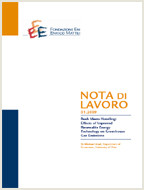A Simple Framework for Climate-Change Policy under Model Uncertainty

22.02.2017
C60, D81, Q42, Q48
Satisficing, Model Uncertainty, Climate Change, Computational Geometry
Mitigation, Innovation and Transformation Pathways
Massimo Tavoni
We propose a novel framework for the economic assessment of climate-change policy. Our main point of departure from existing work is the adoption of a “satisficing”, as opposed to optimizing, modeling approach. Along these lines, we place primary emphasis on the extent to which different policies meet a set of goals at a specific future date instead of their performance vis-à-vis some intertemporal objective function. Consistent to the nature of climate-change policy making, our model takes explicit account of model uncertainty. To this end, the value function we propose is an analogue of the well-known success-probability criterion adapted to settings characterized by model uncertainty. We apply this decision criterion to probability distributions constructed by Drouet et al. (2015) linking carbon budgets to future consumption. The main result that emerges is the superiority of “medium” carbon budgets in line with a 3°C target (i.e., 2000-3000 GtCO2) in preventing large future consumption losses with high probability. Insights from computational geometry facilitate computations considerably, and allow for the efficient application of the model in high-dimensional settings.
***
Suggested citation: Athanasoglou, S., V. Bosetti, L. Drouet, (2017), ‘A Simple Framework for Climate-Change Policy under Model Uncertainty’, Nota di Lavoro 13.2017, Milan, Italy: Fondazione Eni Enrico Mattei
